Tags
Alex Proyas, Ancient Egypt, Geoffrey Rush, Gerard Butler, Mythology, Nikolaj Coster-Waldau, Religious Stuff
So I forced my unfortunate husband to go to Gods of Egypt (2016, dir. Alex Proyas), because it was a way to get out of grading freshman exams for a while. After all the hoopla about it being an egregious example of whitewashing ancient history, I figured I had a duty to my readers to weigh in on it.
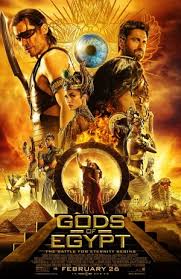
Let’s get that issue out of the way right at the start. It’s an appallingly bad example of whitewashing. Even allowing for some uncertainty about the ethnic composition of ancient Egypt, the film is awfully white. Of the main actors, one (Chadwick Boseman) is black, one (Elodie Yung) is half-Asian, and one (Gerard Butler) is wearing swarthy-face make-up. Everyone else is whiter than my untanned ass. There are lots of blacks and Middle Easterners in non-speaking roles, but literally just two with speaking parts (and one of them mostly just hisses, if memory serves). It’s so bad, it’s downright embarrassing, especially for Butler, who looks like he spent the morning exploring an alternative career as a chimney-sweep before deciding that being in this film was the better option pay-wise.
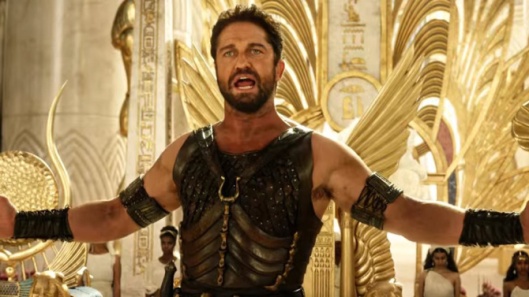
Gerard Butler looking swarthy
But, if you can see past that problem with the film (and I realize that’s a big but), what you see is a film with a whole host of other problems that make the racial issues feel like an afterthought. The acting is lousy, the plot is fairly predictable, the script is shudderingly bad, and the special effects are bloated and excessive. But, hey, they thought to cast a black man in a supporting role! So that’s something.
Normally, at this point, I’d give you a Spoiler Alert. But that implies that this movie could actually be spoiled by finding out what happens in it. You already know what happens in it, which is that it sucks a lot.
Basically, Osiris and Isis have ruled the Nile for a thousand years. They’re gods, which means they’re 9 feet tall while the human Egyptians are normal-sized. Osiris has decided it’s time to step down and let his son, Jamie Lannister (Nikolaj Coster-Waldau), be king, so long as he agrees to let people call him Horus. And, because Osiris is a nice guy, he’s going to let all the Egyptians into the Afterlife for free. But his evil brother Set (Gerard Butler) interrupts the coronation ceremony to show off his new skin-bronzer and in the process manages to kill Osiris, beat the crap out of Jaime and rip out his eyes, and steal the crown of Egypt. And, because he’s a dick, he’s going to force people to buy their way into the Afterlife with treasure. Ain’t capitalism grand?
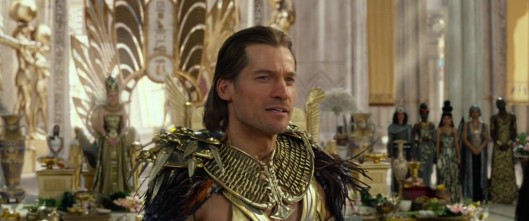
Nicholaj Coster-Waldau taking a break from Game of Thrones by playing Jaime Lannister in Egypt
Fortunately for everyone except the audience, there’s a plucky mortal hero, Bek (Brandon Thwaites), who’s a cheekily-disrespectful roguish thief, who only becomes intolerably annoying when the film hits the two-minute mark. He sets off to rescue his love, Zaya (Courtney Eaton), who’s been killed by Set’s evil architect. He steals one of Jaime’s eyes from Set’s treasure vault, tracks down Jaime and offers him a bargain: Bek will help Jaime recover his other eye (without which he can’t be really super-powerful) and Jaime will bring Zaya back from the dead (which turns out to be just a lie, but that’s the way the Lannisters do things, right?). So Jaime and Bek set out on a series of adventures to recover the missing eye.
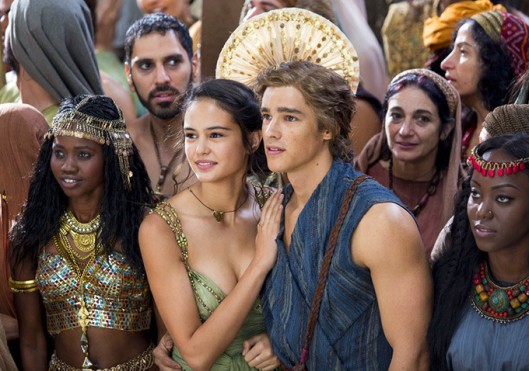
That guy in the background is thinking “Dude, how did these two white people get cast as Egyptians?”
Along the way, they pay a visit to Jaime’s grandfather Ra (Geoffrey Rush) in his ship that drags the sun across the sky, where Ra fights the serpent Apophis every night. (Actually, this scene accidentally manages to be ok.) Then there are various fights with orcs and a couple of understudies for Lady Sylvia Marsh from Lair of the White Worm and some really boring scenes between Set and some goddesses in which nothing gets killed but we find out what the next movie in the franchise is going to be about.
Finally they get to meet up with Chadwick Boseman, who has cleverly hidden the first H in his name so that everyone else has to call him ‘Toth’ but he knows that his name is actually Thoth and so he gets to quietly feel smug about everyone else mispronouncing his name. And T(h)oth gets the Riddle of the Sphinx wrong the first two times but totally aces it on the third try but then…oh, fuck it. You don’t give a damn about a full plot synopsis and I can’t be bothered to figure out what the hell is actually going on in this movie that makes about as much sense as some of the freshman exams I’m currently grading.
Let’s just say that all of this turns out to be an excuse for Set to flog his daddy issues with Ra, who never loved him enough as a kid and couldn’t be bothered to watch his son’s baseball games because he was busy fighting the serpent that wants to devour the world. Set wants to be immortal, but to do that he needs to destroy the Afterlife so he can live forever in Egypt. So Set tries to kill Ra and steals his magic spear that’s necessary to kill the cosmic snake because he’s got Freud issues going on. Without Ra to stop him, Apophis goes crazy and starts eating the Nile because somehow that will destroy the Afterlife. And Jaime winds up having to fight Mecha-Set but opts to save Bek rather than recover his lost eye and then he wishes Zaya back to life because really this whole damn film is just a Very Special Episode of Blossom about the importance of gods and mortals respecting each other.
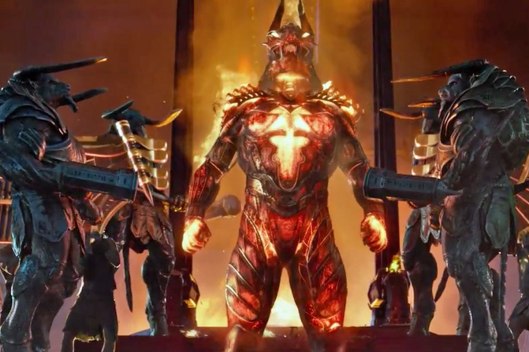
Mecha-Set
Fortunately the sequel gets killed off about halfway through the film.
So, Does This Film Have Anything to Do with Ancient Egypt?
I’m glad you asked that. No.
I mean, yes, it’s called Gods of Egypt and it’s set along the Nile, and it’s got some buildings that look sort of ancient Egyptian if you squint the right way, and the main characters mostly have the same name as various Egyptian gods. But as Proyas himself has said, “…the world of Gods of Egypt never really existed. It is inspired by Egyptian mythology, but it makes no attempt at historical accuracy because that would be pointless — none of the events in the movie ever really happened. It is about as reality-based as Star Wars — which is not real at all …Maybe one day if I get to make further chapters I will reveal the context of the when and where of the story. But one thing is for sure — it is not set in Ancient Egypt at all.”
So, really, the film could just as easily be called Gods of South Dakota, which from the ethnicity of the cast would probably be just about right.
The film basically picks bits at random from Egyptian mythology, without actually bothering to understand how any of it fits together or what it might mean, sort of like a freshman history student writing a mid-term.
The Afterlife features as a key plot point in the movie, but the film has only a minimal understanding of Egyptian notions of what happens after death. The Egyptian Underworld was called Duat, and it was pictured as being much like Egypt, only better. The problem was that getting to Duat was difficult, and a lot of things could go wrong. The deceased person’s body has to survive; without it, the dead person’s soul would be annihilated. The person’s name had to be preserved as well. There were complex rituals to embalm the corpse (hello, mummies!) and “open its mouth” so that the dead soul could speak the proper ritual formulas as it journeys through Duat, so it can get past various monsters and obstacles. The dead person’s heart was weighed against the feather of Ma’at, the Goddess of Truth, to ensure that the deceased had lived a proper life; if the feather was heavier than the heart, the heart and its soul were devoured. The deceased had to be able to make the 42 Negative Confessions, truthfully denying a long list of moral failures and crimes. Burial practices involved an array of spells, charms, and texts, designed to make sure the dead person knew what to say and when to say it, and that various difficulties could be overcome. And the body of a wealthy person was provided with expensive grave goods to ensure that he or she would live comfortably in Duat.
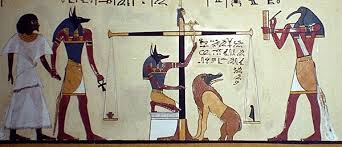
Weighing the feather of Ma’at against the person’s heart
Gods of Egypt, however, jettisons all that in exchange for a far dumber idea. There’s no burial or mummification required. In the Hall of the Two Truths, the dead just walk up to a scale containing the feather of Ma’at, dump their wealth into the other side of the scale as a bribe to the judges, and hope the bribe is big enough. Otherwise, they’re apparently sent to Hell, through a door that alternately flips between good stuff and bad stuff.
How dumb do you have to be to make a movie about the Egyptian afterlife that doesn’t even involve mummies? That’s like making a movie about a college professor grading exams that doesn’t involve tears, shouts of frustration, and abject misery.
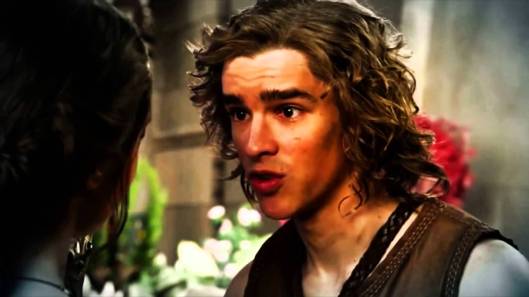
Wait–they cast me to play an Egyptian? WTF?
And Osiris is the God of Duat, but in this film he just disappears after Set offs him. And Isis commits suicide. Wise choice. She doesn’t have to be in the rest of the film.
The biggest problem in the film is Set. He’s correctly associated with the Egyptian desert, which is probably why they gave Butler swarthy-face, to suggest all the time he spent out in the desert. If they’d wanted to be more appropriate, they should have made him red-faced, since the desert is red in Egyptian thought, while the soil of the Nile Valley is black.
Set’s function in Egyptian mythology is hard to explain. He’s a disorderly god, possibly contrasting the sterile, inhospitable nature of the desert to the fertile, orderly Nile Valley of Horus. He’s Ra’s protector when Ra journeys into Duat every night to fight Apophis. He’s the brother of Osiris, Isis, and Nephthys, but he’s also Osiris’ rival. He eventually murders Osiris and struggles with Horus. But ultimately he’s defeated and reconciled to Horus, as a symbol that the Pharaoh (the living embodiment of Horus) is master over everything that challenges Egypt. He’s most definitely not a god of evil, since he’s worshipped regularly in Egypt, alongside all the other gods. It’s only very late in Egyptian culture, when the country is conquered by outsiders, that he is reduced to simple villainy.
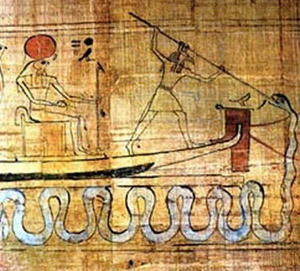
Set fighting Apophis
But Gods of Egypt just throws all that out and makes Set a sort of cosmic Donald Trump, gleefully breaking all the rules, terrorizing the Egyptians, respecting nothing but his own power, and building monuments to his own bloated ego and villainy because he’s got daddy issues.
In Egyptian mythology, Set and Horus have sex, because Set is trying to prove his dominance. But Horus catches Set’s semen in his hand and throws it in the Nile. Then he jacks off onto a piece of lettuce and tricks Set into eating it. Then they go to the gods of Egypt to settle the dispute. Set calls to his semen as proof that he dominated Horus, but the semen answers from the river, disproving his claim. Horus then calls to his semen, which answers from inside Set, thus proving that Horus had dominated Set. For some unfathomable reason, the film completely ignores this very important element of Set’s story.
That story would have made for an awesome movie. It would have made for a way better movie than Gods of Egypt, which just sucks. It’s almost worse than grading exams.
Want to Know More?
Stop that. This film sucks.
But if you want to know more about the actual gods of Egypt, take a look at a book like The Complete Gods and Goddess of Ancient Egypt by Richard Wilkinson. Or try Emily Teeter’s Religion and Ritual in Ancient Egypt.



Reblogged this on Out of Me Head.
LikeLike
Thanks!
LikeLike
This is the funniest post EVER!!! I love your willingness to suffer for your art. (And your willingness to make your husband suffer too!) 😀
LikeLike
This is why the world needs historians. We suffer so you don’t have to.
LikeLike
Well, I hope your relationship is going well otherwise, because, “He forced me to see ‘The Gods of Egypt’.” is the sort of thing I could see being included in a Petition for Divorce.
While it doesn’t quite fit the “…goes to the movies” conceit, I’d love to see your take on the Book of Abraham, as it would make a good companion piece to Gods of Egypt, given the fidelity they both show to the traditions of their mutual source material.
LikeLike
He seems to have forgiven me.
I’m not familiar with Book of Abraham. Can you tell me more?
LikeLike
It’s a Mormon text. Apparently Joseph Smith found some ancient Egyptian funerary texts with a few missing bits and used God’s help to translate them from the otherwise unknown “Reformed Egyptian”. Given the end result of each endeavor, I wonder if this isn’t the same methodology the writers of Gods of Egypt used to come up with a shooting script.
From Wikipedia:
According to Smith, the book was “a translation of some ancient records … purporting to be the writings of Abraham, while he was in Egypt, called the Book of Abraham, written by his own hand, upon papyrus”
…
University of Chicago Egyptologist Robert K. Ritner concluded in 2014 that the source of the Book of Abraham “is the ‘Breathing Permit of Hôr,’ misunderstood and mistranslated by Joseph Smith.”
https://en.wikipedia.org/wiki/Book_of_Abraham
LikeLike
Ah, that. Yes, I’ve heard about that. Has it been made as a movie.
LikeLike
Has it been made as a movie?
Sadly, no, not that I’m aware of. Considering the fact that a number of devout Mormon Egyptologists (including at least one from BYU, if I remember correctly) have confirmed that the text is not what Smith claimed it was, I doubt the church wants to advertise this particular part of their history today. In that way its similar to their current position on the “Curse of Cain” and what I have to imagine their position on homosexuals will be in maybe five or ten years. Essentially, “Nothing to see here” Irish cop voice at your own discretion.
https://en.wikipedia.org/wiki/Curse_and_mark_of_Cain#Latter-day_Saints
LikeLike
I mostly focus the blog on cinematic (and tv) depictions of history. So I can’t really tackle a document that’s not filmed. Nothing to me to work with.
LikeLike
Maybe if Gerard Butler agreed to read the audiobook?
LikeLike
Honestly, I would totally watch a Wes Anderson film about Horus and Set arguing about who exactly jacked off who during that camping trip, especially if it took place at a family dinner, with Isis and Osiris and everyone else getting increasingly uncomfortable, before moving on in an slightly overintentionally quirky way.
LikeLiked by 1 person
I know, right? Way better movie!
LikeLike
I can’t believe you saw it! When I saw the trailer for it I groaned inside, felt this growing sense of dismay as the trailer unfolded, then turned to my husband in the theater and said, “I think they’ve taken some liberties with the gods of Egypt.” He said, “You think?!” Heh So yeah, I don’t think I could be paid enough to go see that movie. You are a brave and hearty soul.
Here’s something interesting, I took Wilkinson’s class at U of A! One of the better classes I’ve taken. It was a very long time ago, but I still sometimes wish that I could go back and take it again. I’m glad you’ve given him props here. You know if moviegoers were expected to take such classes before heading off to see their films, atrocities like Gods of Egypt would no longer be made. Everything changes when the lowest common denominator of your target audience becomes even slightly more educated.
LikeLiked by 1 person
Yeah, that’s sort of the philosophy behind this blog–educate people a little and (hopefully) raise standards a smudge.
LikeLike
Or a smidge even.
LikeLike
White-washing aside, my biggest problem with the idea of it is that they look human, only bigger. I’m not sure, but usually when I see Egyptian Gods on a documentary in hieroglyphics, they always have animal heads. I don’t know about Set or Osiris, but I’m fairly certain Horus has a falcon head. I would have thought any movie about the Gods of Egypt would have them look that way. Would have been much cooler. As for the white-washing, it’s pretty blatant, but not the least bit unexpected from Hollywood.
LikeLike
Most, though not all, Egyptian gods, were conventionally depicted with animal heads. Horus was a hawk, Thoth an Ibis, and Set had an unknown creature (suggestions have included a giraffe, a donkey and an aardvark). Osiris and Isis were human-headed, however.
LikeLike
I would predict that in semesters to come, the film will continue to haunt you in the very exams you were trying to escape 😉 Speaking as someone who fights with “Gone With The Wind” in one half of the American survey and “JFK” and “Pearl Harbor” in the other 😦
LikeLike
All films I need to tackle in this blog at some point.
LikeLike
Pingback: I Am Henry: Just What I Needed | An Historian Goes to the Movies
Greetings, I came by your blog thanks to a query I had. I asked google, “What is correct, a historian or an historian?” I was offered a few links. I chose yours. I too am ‘an historian’ kinda gal.
After having fun reading your answer, I headed over to your blog for further exploration. And here I am. I read your ‘About’ Section and discovered to my delight that you’re a true student of history, a scholar who views movies and shows from that point of view. I was IN and naturally headed over to the list of reviewed movies.
Scrolling down the list while hoping I had found a great resource, I came to this review. I told my daughter, “This review will tell me whether or not I can trust his POV.”
Reading your opening line, I laughed out loud. Yup, this new scholarly partnership was definitely going to work for me.
I too have a passion for history; ancient, medieval, battles of antiquity. Myths are also my bag, fueled by a wild, insatiable love for those of Ancient Egypt.
I saw the books you recommended and thought I would share one of my all time favorites with you. Written by John Anthony West, a genius, alternative Egyptologist and symbolist, whose description of the Neter and their meanings is without peer.
“The Traveler’s Key to Ancient Egypt.”
By John Anthony West
Don’t let the title fool you. Yes it is a Traveler’s Guide that takes you on a grand symbolist’s journey through Ancient Egypt, it also describes in great detail and accuracy, the Gods, their functions, their temples, their characteristics the whole enchilada.
So thanks for the fun. I now have a wonderful new site to source with an author who is witty and on par with my high expectations of ‘an historically’ based film.
Funny, I just landed back where I began! An ouroboric journey indeed. Fabulous!
All the best,
Constance Smith
LikeLike
I’m glad you liked that review. It’s one of my masterpieces, really.
LikeLike
LOL, i just died, but came back because paid set 100$. Haha jep as a „historician” too, i do go to watch all the shitty „history” hollywood movies. And this was one of the worst ones (yep i am a egypt nerd since the age of 8).. and that well almost made me cry, hahah.
Worst movie ever … and i once saw „attack of the killer tomatoes”.
Cheers!
LikeLike
Dear aelarsen, My name is José Maria Neto, and I teach at State University of Pernambuco, Brasil. I’m doing an article about the use of Gods of Egypt in the teaching of History, and came across your Blog. I’m a historian asnd, just like you, a gay man. I’d love to share some thoughts about the relations between movies and History.
Thank you very much, José.
LikeLike
Was there a particular issue you wanted to discuss?
LikeLike
This review is both ignorant of the genetic composition of ancient egypt and racist at the same time.
The current arab makeup of egypt is a result of islamic invasion in the wake of the collapse of the Roman Empire. Dna analysis of mummies consistently demonstrates European background.
We have all met a racist that is kosher in our society, and you are consistent. The marketing idea to use white actors for a white audience is considered racist by you. Then are you also upset at the myriad of western roles that are being race swapped? We all know the answers. You would celebrate the ethnic cleansing. We can pull the plug on the social sciences. The career crafters in there have refused to develop anything of note since the 1950s.
LikeLike
“Dna analysis of mummies consistently demonstrates European background.”
The first successful extraction of DNA from a mummy only took place 7 years ago, and what the team doing that work discovered was that ancient Egyptians most closely resembled Middle Eastern and Levantine populations. So your claim that the dna demonstrates European background is simple false.
Have a nice day.
LikeLike
Those haplogroups are only genetic markers, from mitochondrial dna, that can be used to differentiate what are otherwise similar genomes. They are shared by greek, Italian peoples as well. Your kosher revisionist history also consciously omits the ethnic cleansing of the entire African and Fertile Crescent roman era peoples. All of those populations were displaced.
LikeLike
There was no ‘ethnic cleansing’ of anyone during the Roman era. That wasn’t something the Romans had much interest in doing. Additionally, these mummies predate all of that.
What are your scholarly qualifications? Do you have a doctorate in a field relevant to the study of the past?
LikeLike